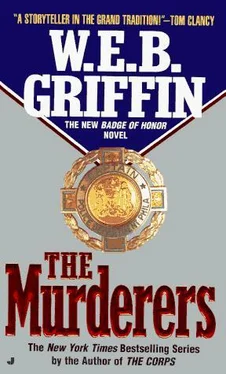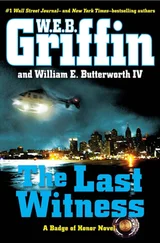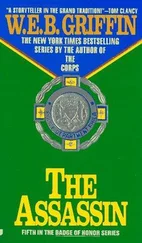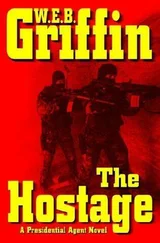W. Griffin - The Murderers
Здесь есть возможность читать онлайн «W. Griffin - The Murderers» весь текст электронной книги совершенно бесплатно (целиком полную версию без сокращений). В некоторых случаях можно слушать аудио, скачать через торрент в формате fb2 и присутствует краткое содержание. Жанр: Полицейский детектив, на английском языке. Описание произведения, (предисловие) а так же отзывы посетителей доступны на портале библиотеки ЛибКат.
- Название:The Murderers
- Автор:
- Жанр:
- Год:неизвестен
- ISBN:нет данных
- Рейтинг книги:5 / 5. Голосов: 1
-
Избранное:Добавить в избранное
- Отзывы:
-
Ваша оценка:
- 100
- 1
- 2
- 3
- 4
- 5
The Murderers: краткое содержание, описание и аннотация
Предлагаем к чтению аннотацию, описание, краткое содержание или предисловие (зависит от того, что написал сам автор книги «The Murderers»). Если вы не нашли необходимую информацию о книге — напишите в комментариях, мы постараемся отыскать её.
The Murderers — читать онлайн бесплатно полную книгу (весь текст) целиком
Ниже представлен текст книги, разбитый по страницам. Система сохранения места последней прочитанной страницы, позволяет с удобством читать онлайн бесплатно книгу «The Murderers», без необходимости каждый раз заново искать на чём Вы остановились. Поставьте закладку, и сможете в любой момент перейти на страницу, на которой закончили чтение.
Интервал:
Закладка:
If they had a garbage can, or a cardboard box, or some other container that could be used as a substitute, and if they remembered what day the garbageman came, they often-but by no means always, or even routinely-put their garbage on the curb for pickup.
It had been Officer Woodrow Wilson Bailey’s experience that a substantial, and growing, number of the trash-white, brown, and black-who had moved into the neighborhood had decided the least difficult means of disposing of their trash was to either carry it into (or throw it out the window into) their back-yards and alleys when the garbage cans inside their houses filled to overflowing, or the smell became unbearable.
There was little he could do about this. The criminal justice system of Philadelphia was no longer able to cope with many Summary Offenses, and issuing a citation for littering was nothing more than a waste of his time and the taxpayers’ money. He would show up in court, the accused would not, and the magistrates were reluctant to issue a bench warrant for someone accused of littering a back street in North Philadelphia. The police had more important things to do with their time.
He privately thought that if the trash wanted to live in their own filth, so be it.
At a certain point in time, however, backyards became filled to overflowing with refuse. Just about as frequently, the piles of garbage became rat-infested. When either or both of these circumstances occurred, the trash’s solution to an immediate problem was to set the garbage on fire. This both chased the rats away and reduced the height of the garbage piles.
It was at this point that Officer Woodrow Wilson Bailey drew the line. This was a violation of the law that presented a clear and present danger to innocent persons.
Even trash had rights. It was not fair or just that they get somebody else’s rats. And not all the people on Woodrow’s beat were trash. There were a lot of folks who reminded Woodrow of Mamma Dear and Daddy, hardworking, Christian people who had worked all their lives to buy their own home, and when they’d finally finished, about the time they went on retirement, they found that the neighborhood’s having gone to hell meant they couldn’t sell their house for beans, and were stuck in the neighborhood with the trash.
It was, in Woodrow’s mind, a sin that trash should set fires that could burn down the houses next door, taking all the poor old folks had left in the world.
Woodrow did not think of it, as some people concerned with social justice certainly would, as taking the law into his own hands. He thought of it first as something that had to be done, and rationalized that he was providing a genuine service to the people he had sworn to protect.
He dealt with people who set fires in his own way, without getting the overworked criminal justice system involved. And over the last couple of years, the word had gone out on his beat that burning garbage was socially unacceptable conduct, and that doing so brought swift punishment.
Officer Bailey was thus surprised and angry when through the open window of RPC 3913, as he rode slowly down an alley behind Shedwick Street, his nostrils detected the peculiar smell of burning garbage.
He stopped the car, put his head out the window and sniffed, and then backed the car up.
There was smoke rising above the wooden fence separating the backyard of a row house from the alley.
He was less surprised when he searched his memory and came up with the identity of the occupant of the house. White trash, and a junkie. White trash born right here in Philadelphia. His name, Woodrow recalled, was James Howard Leslie. White Male, twenty-six, 150 pounds, five feet nine. He had been in and out of some kind of confinement since he was twelve. Lived with some brown-trash Puerto Rican woman. Not married to her. Three kids; none of them looked like they ever had a decent meal.
Now he had a mental image of him. Junkie type. Long, dirty hair, looked like he hadn’t had a bath-and probably hadn’t-in two weeks. Had a little scraggly beard on the point of his chin. Called himself “Speed.”
Officer Bailey got out of his car, taking his stick with him. There was a gate in the fence, held shut with a chain and a rusty lock. Woodrow put his stick in the chain and twisted. The chain and rusty lock held; the rotten wood of the fence crushed under the pressure and gave way.
Woodrow pulled the gate open and entered the backyard. His anger grew. The fire was coming from a pile of garbage against the fence. The fire would almost certainly set the fence on fire. He saw a rat scurry out from the pile.
Flames flickered on the garbage pile. There was an old tire on the pile. Once a tire caught fire, you could hardly put it out. Tires burned hot and hard and gave off thick smoke.
First things first; get the fire out.
There was a grease can with a Texaco sign on it. Woodrow picked it up. It was empty, but there was the smell of gasoline.
“Trash!” Woodrow muttered in angry contempt.
Speed had used gasoline to start the fire. That was dangerous.
Moving quickly, Woodrow went to a water spigot. He knew where to find it, even behind the trash. All these houses were alike, like they were stamped out with a cookie cutter.
He rinsed out the Texaco grease bucket twice, then filled it up with water.
It took six buckets of water to put the fire out, and Woodrow threw a seventh one on the garbage, to be sure. As he looked for a hint of smoke, he glanced at his shoes. The shoes he had shined with such care just two hours before were now covered with filth.
Then he went to the rear door of the residence and knocked on it. There was no response. Woodrow knocked again, and again there was no response. Woodrow gave the door a couple of good licks with his stick.
“Who the fuck is that?” a voice demanded in indignation.
“Speed, get your trashy ass out here!”
James Howard Leslie appeared behind the dirty glass of his kitchen door, and then opened it.
He did not seem particularly happy to see Officer Bailey, but neither did he seem at all concerned. He was wearing dirty blue jeans, a bead necklace, and nothing else.
“What’s happening?” Mr. Leslie inquired.
Officer Bailey lost his temper. He caught Mr. Leslie’s wrist and twisted it behind his back. Then he marched Mr. Leslie off his porch and to the smoldering pile of garbage, and manipulated Mr. Leslie’s body so that his nose was perhaps six inches from the garbage.
“That’s what’s happening, Speed,” Officer Bailey said.
“Man, you’re hurting me! What the fuck!”
“You trying to burn the neighborhood down, Speed? What’s the matter with you? You lost the sense you were born with?”
“What the fuck is the big deal? So I burned some garbage! So what the fuck?”
At this point in similar situations, it was normally Officer Bailey’s practice to first hurt the trash a little, either with a slap in the face or by jabbing them in the abdomen with his stick to get their attention. To further get their attention, he would then put handcuffs about their wrists and search them for weapons and illegal substances. Very often he encountered the latter, if only a few specks of spilled marijuana in their pockets.
Then he would explain in some detail what crimes they had committed, with special emphasis on the punishments provided by law. If he had found illegal substances on their persons, so much the better.
By then, the malefactor would be contrite. He did not want to go through the inconvenience he knew would be associated with an arrest: detention in the Thirty-ninth District, followed by transportation way the hell downtown to Central Lockup. And then several hours in Central Lockup before being arraigned before a magistrate.
Читать дальшеИнтервал:
Закладка:
Похожие книги на «The Murderers»
Представляем Вашему вниманию похожие книги на «The Murderers» списком для выбора. Мы отобрали схожую по названию и смыслу литературу в надежде предоставить читателям больше вариантов отыскать новые, интересные, ещё непрочитанные произведения.
Обсуждение, отзывы о книге «The Murderers» и просто собственные мнения читателей. Оставьте ваши комментарии, напишите, что Вы думаете о произведении, его смысле или главных героях. Укажите что конкретно понравилось, а что нет, и почему Вы так считаете.











